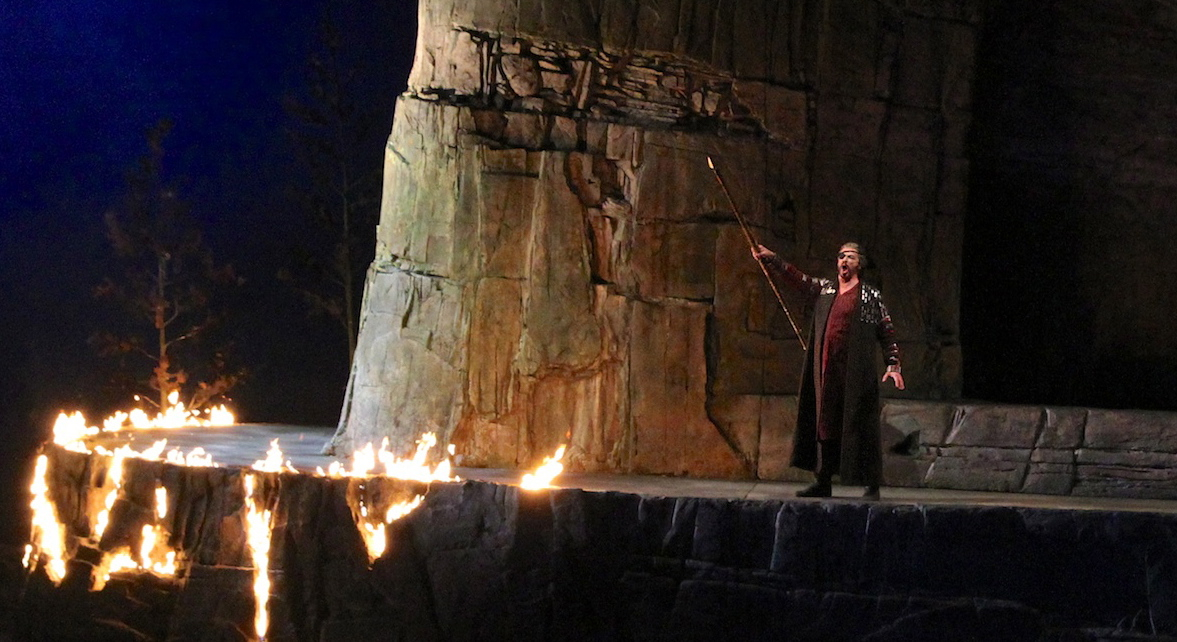This summer’s Seattle Opera performances of Richard Wagner’s The Ring of the Nibelung may or may not be the last go-round for the current production directed by Stephen Wadsworth—what’s been termed their “green Ring.” Assuming the four-year rotation continues, 2017 is the next date scheduled for the company’s staging of the tetralogy (Das Rheingold, Die Walkure, Siegfried, Gotterdammerung). That’ll be early in the tenure of incoming general director Aidan Lang—perhaps too early for him to start a Ring from scratch. What’s certain is that this presentation of Wadsworth’s highly popular and acclaimed 2000 staging is the company’s strongest performance yet of the epic—more vivid, more gripping, more moving than ever.
The singers slated for the Ring’s two lead roles are new to Seattle Opera. As a friend pointed out, there was nothing to fear when tenor Stefan Vinke opened his mouth to sing Siegfried—no catches, no close calls or shakiness; it never sounded like a high-wire act. To name just one example, he was magnificent in the final scene of Siegfried, his voice wonderfully warm-toned in the quiet passages of the opening (after he’d already been singing for three hours), but he still had plenty in the tank for the fireworks of his closing love duet with Brunnhilde. Full-out loud singing, of which Wagner asks for plenty, seems to energize rather than tire him. Owing to a virus, the first cycle, August 4-9, featured two Brunnhildes, both excellent. Alwyn Mellor, in Die Walkure, brings the punch the role requires, but at softer volume shows off her voice’ s silken surface. Understudy Lori Phillips—heard here a year ago as Puccini’s Turandot—took over heroically for Siegfried and Gotterdammerung; Friday’s performance in the latter opera was not only her first onstage of that role, but her first time ever singing it with an orchestra.
Among the returnees from past performances, Stephanie Blythe lavishes on Fricka the kind of singing that makes you forget it’s singing: not only gorgeous, vibrant, and effortless, but pure, direct emotional communication. The Ring’s conscience, Fricka can seem like a scold on paper, possessive and implacable, but Blythe’s warmth adds layers to the character and makes it clear her primary motivation is affection for her husband Wotan, the deeply flawed god-king. This time around, Greer Grimsley pushes Wotan further in every direction: his power-lust more disturbing and unsympathetic, his eventual downfall more pathos-laden.
Richard Paul Fink’s voice is never far from a growl as Wotan’s nemesis Alberich, the vengeful scorpion who crawls through the cycle. Fink, surely one of the all-time great exponents of the role, plays him to the hilt, hinting at the wounded heart beneath (far beneath) the evil. Even the briefer roles in SO’s deep bench feature high-caliber artists like Mark Schowalter, who as fire god Loge brings a clarion voice to all his narration in Rheingold, and Andrea Silvestrelli, who somehow makes his voice—curiously colored, with a certain haunting hollowness—work wonderfully while dual-cast as both the sympathetic giant Fasolt and the brutal Hunding.
My two favorite moments in the cycle come thanks to decisions Wadsworth and the singers made, ones implicit but not directly stated in Wagner’s score or libretto. Almost immediately after the giants Fasolt and Fafner gain control of the Ring in Rheingold, its corrupting curse takes hold and the latter murders the former, with a grisly little brain-splattering stage effect. The dead body, and the brains, are left lying in plain sight at the front of the stage as the gods ascend to Valhalla to some of the cycle’s most overwhelming music—except for Fricka and Loge, who, voicing their skepticism, remain behind to worry over the corpse. It’s obvious to them, and to us, that this is the beginning of the end for the gods, rather than the triumph suggested by the thundering in the pit; the dramatic irony is deeply arresting.
The second came at the end of Act 1 of Walkure, the meeting and elopement of Siegmund and Sieglinde, fated to be Siegfried’s parents. Stuart Skelton and Margaret Jane Wray are ablaze here; their slow transformation from harried fugitive and browbeaten wife to ecstatic lovers builds to a climax of heart-pounding abandon.
In the pit, conductor Asher Fisch engineers an astonishingly skillful orchestra/voice balance, but lets the Seattle Symphony loose after the voices go quiet—for example, at the ends of scenes, driving thrillingly to blackouts. Was I just sitting in a sweet spot for the low brass, or did their stentorian blasts really sound that stunning? On top of every other achievement, this also must be one of the funnier Rings ever, with the audience appreciatively attuned to the occasional wry nuances in Jonathan Dean’s expert supertitles.
Under Peter Kaczorowski’s lighting, Thomas Lynch’s forest sets (you can practically smell the bark) provide some ravishing tableaux. (Even the curtain call for Rheingold is stunning.) A rebuke, it seems, to today’s CGI-driven film/video game aesthetic, this is very intently a human-scaled Ring—both narratively, in its focus on affecting character interaction and the importance of Nature, and, for all its dazzlements, in its stagecraft. (The rest of it, the work’s allegorical richness, is left to us to tease out—we’re invited to think rather than told what to think.) The toad Alberich transforms into is clearly and charmingly a puppet; the Rhine Daughters float and tumble on visible wires. These flourishes intensify, rather than distract from, the wonder. Opera has long prided itself on being the last bastion of the live, unamplified human voice in all its glory, and as a theatrical spectacle, SO’s Ring takes the same approach: Glorious as it is, you never forget that people are doing all this, not some pixel-pushing mouse-clicker—and it’s happening in real time, in the same room as you.
gborchert@seattleweekly.com
SEATTLE OPERA McCaw Hall, 321 Mercer St. (Seattle Center), 389-7676, seattleopera.org. $300–$1,460 per cycle. Cycle 2 ends Aug. 17; Cycle 3 runs Aug. 20–25.







